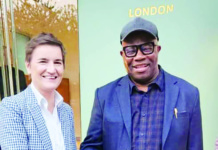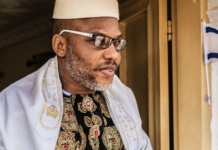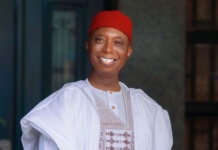
By Olakunle Agboola – It is yet another twinkling of transition for Nigeria as the country goes to the polls on Saturday, 25th of February 2023 to elect a new President, and members of the National Assembly in what amounts to a seventh cycle of general elections, since the country’s return to democratic, civilian rule in 1999. There is so much anticipation as Nigerians, and the rest of the world is watching for a peaceful democratic transition, without any bottleneck to mar the electoral process.
Eighteen candidates are elbowing to succeed President Muhammed Buhari as leader of Africa’s biggest economy, but the top contenders include, Bola Tinubu, a two-term former governor of Lagos- State and a major exponent of the ruling All Progressives Congress (APC) party. Atiku Abubakar of the People’s Democratic Party (PDP) is a former vice president, and this year makes it the sixth time he has been running for the office of the president. Peter Obi of the Labour Party (LP) is a two-time former governor of Anambra- State. He has a huge number of followers who have identified themselves as ‘’obidient’’. Lastly, Rabiu Kwankwaso is running on the platform of the New Nigeria Peoples Party (NNPP). He is an ex-defense minister and former governor of the northern hub of Kano.
All Progressives Congress (APC)
The All Progressives Congress (APC) is a political party in Nigeria, formed on 6 February 2013 in anticipation of the 2015 elections. APC candidate Muhammadu Buhari won the presidential election by almost 2.6 million votes. Incumbent President Goodluck Jonathan conceded defeat on 31 March.
This was the first time in Nigeria’s political history that an opposition political party unseated a governing party in a general election and one in which power transferred peacefully from one political party to another. In addition, the APC won the most seats in the Senate and the House of Representatives in the 2015 elections.
Many have argued that Bola Tinubu is the brain behind the success of the party in 2015 and there is so much hope if he could put all his political ideology on the table to win on Saturday.
The former, a two-term governor of Lagos, Nigeria’s economic capital, is credited with raising the state’s revenue, and supporters say he will replicate his success on the national stage advancing the Nigerian economy.
Tinubu courted controversy with his Muslim-Muslim ticket by selecting Kashim Shettima, ex-governor of Borno, as his running mate. Also, many have argued his age, school certificate, ill health, ‘emilokan’ syndrome, and his mental capacity to lead.
Labour Party (LP)
The Labour Party (LP) is a social democratic political party in Nigeria. The party was created in 2002 and was previously known as the Party for Social Democracy (PSD) before changing to its current name the following year. Built on the ideology of social democracy, the party aims to promote and defend social democratic principles and ideals to achieve social justice, progress, and unity.
On 27 May 2022, the party’s membership and support increased drastically as the former governor of Anambra State, Peter Obi, joined the party shortly after he quit the Peoples Democratic Party (PDP) in a bid to run for the 2023 Nigerian presidential election.
Multiple polls have predicted a win for the Labour Party and Obi, who has a large following among Nigerian youths who are disenchanted with governance in Africa’s largest economy. He was on the PDP ticket alongside Abubakar in 2019.
Obi, a wealthy capitalist famed for his frugality and overseeing an infrastructure drive during his time as governor is running with Yusuf Datti Baba-Ahmed, a former senator from the northwestern state of Kaduna.
The opposition parties have questioned the Labour Party’s structure to win the general election. Also, they have doubted Peter Obi’s winning and attributed his popularity to a movement on social media that won’t automatically translate to victory at the poll.
Peoples Democratic Party
The Peoples Democratic Party is one of the two major contemporary political parties in Nigeria, along with its main rival, the All Progressives Congress.
Its policies generally lie towards the center-right of the political spectrum. It won every presidential election between 1999 and 2011 and was, until the 2015 elections, the governing party in the Fourth Republic, although sometimes amid a few controversial electoral circumstances.
Atiku Abubakar is a PDP Presidential candidate and has run unsuccessfully for President of Nigeria five times (1993, 2007, 2011, 2015, and 2019). He ran in the Social Democratic Party presidential primaries in 1993 but lost to Moshood Abiola and Baba Gana Kingibe.
He was a presidential candidate of the Action Congress in the 2007 presidential election coming in third to Umaru Yar’Adua of the PDP and Muhammadu Buhari of the ANPP. He contested the presidential primaries of the Peoples Democratic Party during the 2011 presidential election losing out to incumbent President Goodluck Jonathan.
In 2014, he joined the All Progressives Congress ahead of the 2015 presidential election and contested the presidential primaries losing to Muhammadu Buhari. In 2017, he returned to the Peoples Democratic Party and was the party’s presidential candidate during the 2019 presidential election, again losing to serving President Muhammadu Buhari.
In May 2022, he was chosen as the Peoples Democratic Party presidential candidate for the 2023 general election after he defeated Nyesom Wike, the current Governor of Rivers State, in the primaries.
PDP supporters are in high spirits believing that Atiku will win the presidential election. Also, there has been controversy if Atiku is competent enough to take Nigeria to the promised land.
New Nigeria Peoples Party (NNPP)
The Nigerian Peoples Party (NPP) was one of the major political parties that contested elections in the Nigerian Second Republic. The party was made up of three major groups: the Lagos Progressives, Club 19, and the Nigerian Council of Understanding.
Kwankwaso being the Presidential candidate comes with enough experience to match the other frontrunners. A former two-time governor of Kano and defense minister, he has served in the two houses of parliament.
He is immensely popular among the youth in his home region for his welfare-statist politics. One big achievement was a significant scholarship scheme that benefited thousands of students from low-income households in Kano, previously known for its high numbers of the almajirai, out-of-school child beggars.
Kwankwaso is running alongside Isaac Idahosa, a bishop in the Pentecostal Christian denomination, who hails from Edo State in the south.
Key concerns in this election?
- Corruption
- Crime and terrorism (specifically Boko Haram insurgency and Fulani Herdsmen)
- Unemployment
- Education and university systems
- The environment
- Infrastructure
- Gender-based discrimination
- Road accidents
- The economy
Buhari came to power promising to fix the economy, as well as to tackle corruption and insecurity. But it is believed that his government has endured two recessions in the last five years, and the naira has tumbled to one-third of its value.
There is a huge problem of insecurity, especially in the northeast, northwest, and southeast, where multiple armed groups hold grievances against the state and continue to conduct frequent rounds of killings and kidnappings.
Corruption takes many forms and infiltrates all political institutions and economic sectors. It is so sad that the government, which is set up to build the country and fight any form of corruption, has continued to steal from its people.
Nigeria’s unemployment rate is about 43%. That number reflects only those who are actively seeking employment. Many Nigerians have given up looking for jobs, after years of fruitless efforts.
The number of Nigerians living in poverty rose by 35 million in 2022. This level of economic hardship gave birth to ‘Japa’ having many Nigerians leaving the country in search of greener pastures.
Electing problem solvers
It is up to Nigerians to vote for competence, character, and problem solvers come the 25th of February this year. It is important as a nation to avoid the mistakes of the past and entrust the governance of the country to competent hands, which are beyond ethnicity and religious bias.

Kindly follow us on twitter:@AfricanVoice2








